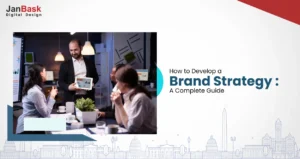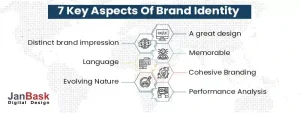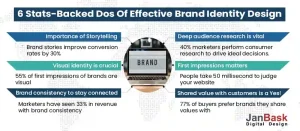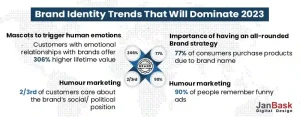
You want your brand to be top of mind for your customers, but how do you achieve this? Creating a distinct brand identity for your business is the way to do so. Your business's identity reflects your company's reputation, image, and personality, which people see when they purchase your product or service. It plays a crucial role in winning the trust of your target audience. Edelman's report says customers feel more willing to stay loyal, buy first and advocate for the brands they trust.
However, its definition ranges from something as simple as a logo and color scheme to more complex things like core values or even how your company treats your customers. Thus, optimizing these aspects is a must. Here is a detailed guide on dos and don'ts of practices for your company's branding services and identity design.
You know what brand identity design is and how critical it is, but let’s have a precise snapshot of what Brand identity stands for nowadays!

Looking to Improve Company's Brand Identity?
Brand identity has moved beyond having a famous face attached to your brand, or how great your logo and packing are, or how famous you are on traditional modes of advertising. No matter how powerful your brand presence is on the traditional forms of media if it does not resonate with your target audience, if there is no brand recall you’re not in there!
Brand identity is the total impression an organization or product has on its target audience. It includes visual components such as colors, logos, typography, images, and other graphic elements. Additionally, it includes verbal components such as the brand’s tagline, tone of voice, mission statement, and core values. All of these components come together to create a unified message that resonates with the target audience.
A strong branding identity design is essential for any business to build a positive reputation and stand out from competitors. It acts as an extension of the company’s values and helps create a more personal connection with customers. Additionally, it can help increase customer loyalty, visibility, and sales.

Having a clear idea about how to create a brand identity and designing a brand identity is important. It revolves around the top 3 elements: service, product, and buyer persona. Infuse the below-given aspects to optimize these 3 elements and make your brand appealing to your customers:
A key component of brand identity design is using visuals to create a unified, recognizable, and memorable look. Visuals such as logos, color schemes, typography, imagery, and illustrations work together to create a consistent brand image and improve brand awareness so that customers will recognize and associate with the company. The right visuals help to differentiate the brand from its competitors.
Ensure to leave a distinct impression on your target audience by highlighting the brand's USPs, unique values, brand personality, following brand-based website designing tips, etc. The in-depth audience, and competition research, help design a distinct and competitive brand identity.
Having a visual impact on your audience goes a long way. Using visual elements that embody what your brand is all about can help make it memorable to customers.
Connecting with your audience through a language they understand is a way to engage with them effectively. It must embody the same in the brand's social media accounts and advertisements.
Your brand must consistently present itself in everything you do. It's about making your audience understand who you are and what your brand stands for.
E-commerce trends have been changing rapidly for the past few years. Thus, the only way to survive in today's e-commerce space is to embrace growth and evolve with time and changing trends.
Creating a brand identity depends not only on how it looks and feels to your audience. Regularly monitoring what kind of business image the current brand design is creating in customers' minds is vital. Having a professional web design agency can be an invaluable asset here.
Now that you have an idea of the key aspects of a perfect brand identity, let's see the essential points to remember while creating an effective branding identity design.

Creating a brand design includes identifying the ideal portrayal of products and services that fit best your brand's goals. However, here are a few approaches that you must do to ensure successful e-commerce branding:
Customer research is a mandatory practice that involves understanding customers' needs based on their sex, age, location, etc. But that is not it. A comprehensive market/ audience research goes deeper into knowing your audience. Here’s how to create a brand identity with the help of primary and secondary research:
You get first-hand information on customers and the market. It is further divided into exploratory and specific primary research.
Exploratory research deals with potential pain points of customers that must be tackled. You can run online surveys of open-ended interviews with customers.
Specific research involves a small segment of your audience and asks questions about a suspect pain point to resolve it.
You get information from public records and data such as industry content, trend reports, market statistics, etc., to conclude buyers’ persona. It includes
Primary and secondary research will help you learn what your customers want. Thus, you can build an effective branding strategy.
As per the branding identity definition, its purpose is to build business-customer relationships. Thus, the best way to create an ideal brand identity is by treating your brand as a human. Focus on identifying the brand’s:
Ask yourself the following questions before deciding on your brand identity design:
You have already done all the market research and have figured out how your brand will interact with your customers. But sharing the same values as your audience can take your business-customer relationship to the next level.
77% of consumers prefer buying from businesses that share the same values as they do.
Try to learn what your target audience finds meaningful and create a relevant brand identity.
Who doesn't like stories? People love to know the inspiring backstory of the brands they adore. Brand-related stories tend to increase customer trust and brand connection by 4%.
When writing the About Us section for your website, write a detailed story about what inspired you to start the brand to establish a humanized connection with website visitors.
A backstory will also help you develop effective marketing messages relevant to your audience. Don't forget to mention trials, failures, and other critical elements that can create a strong emotional connection with the audience. You can highlight how your target audiences, such as youngsters or families, love your products.
55% of first impressions of a brand are visual. Thus, optimizing visual identity is a critical part of creating brand identity. Creatives and designers brainstorm to create a unique visual representation of your brand. You must ensure that all visual assets, including animations, images, colors, fonts, etc., appear consistent across all mediums. It is important as visuals can look different on different channels if not adjusted. Thus, it will hinder your brand from staying visually consistent with your audience.
Besides visual assets, other aspects of your brand, such as its values, messaging, etc., should be consistent across every channel.
A study by Lucidpress suggests brands with consistent presentations have seen 33% higher revenue.
The practice also enables customers to recognize a brand quickly and position it as a known business.
While knowing what it takes to create an ideal brand identity is necessary, knowing what you shouldn’t do is equally important. So, let’s take a look at that as well.
Suppose you have followed website navigation best practices, branding best practices and have done everything right. But, still you ain't satisfied with the results. So, what might be missing?
The answer to this isn't in what you can do, but in what you must stop doing. You might be repeating the same mistakes which are hindering expected results.
The best way to know what you should never do while designing your brand identity is to do competitor analysis. You can study branding failures your competitors went through and how they overcame them. Exploring others' branding approaches gives you plenty of options to try for your own brand. However, here's a detailed overview of the most common mistakes that businesses make while they create a brand identity.
Add these pointers to your don'ts list:
Most brands rush to be consistently present on every platform to stay in touch with their audience. Thus, they don't put much effort into choosing the right words, tone, and platform that fits best to the brand message they want to convey. For example, you can not use the message format for your brand's Instagram audience that you use for your website visitors. Most social media users have fewer attention spans. Thus your message needs to be short yet descriptive. Using unfitting language or tone will make no sense to your audience.
One of the differences between thriving and average brands in their efforts to make their website unique. Many brands use website templates similar to other brands. A unique or trendy e-commerce website makes brand identity design more appealing. Thus, a non-personalized website design that doesn't represent your brand's identity is a big no. Moreover, the importance of web design is not limited to how it appears, but it also covers how it interacts with them and nothing pleases humans more than a personalized brand experience.
Tracking competitors' moves is an effective way to pursue a competitive brand identity and design. However, the problem arises when brands copy exactly what others are doing. Today's customers are smart enough to recognize these things. They look for brands with an edge over others. Innovating your existing products or services as per the trends and customers' needs is the way to stay ahead.
Brands that haven't updated their marketing tools in 2023 will find it difficult to keep pace with up-to-date brands. It's important as marketing trends keep changing within a few days to a few months. Though some trends repeat, you can not please your target audience with marketing methods that don't work anymore. Thus, staying updated with current market trends is vital. For example, today's online customers prefer business websites that are mobile-friendly. It is understandable as mobile devices give them quick access to their online needs anytime, anywhere. Thus, brands that do not follow mobile responsive design best practices in today's time will no doubt lag behind their competitors.
76% of employees say a company is more appealing if it provides additional staff training. Thus, brands focusing on how to create a brand identity but not on retaining and hiring the best talent are likely to lose good employees. A progressive learning curve for employees enables them to do their best work for the brand. It reflects your brand's efforts and conveys a strong message to the audience about its value.
To create a thriving brand identity in 2023, you must pay attention to today's popular branding trends. They tell you what your target audience wants from your brand and how your competitors are trying to deliver the same. Check out the below-mentioned branding trends that you can try:

In the next few years, businesses must focus on creating unique, recognizable identities that will resonate with their target audiences. Having a clear and consistent brand identity will help businesses build trust with potential customers, establish credibility in the industry, and create opportunities for growth.
To achieve this goal, businesses must ensure their branding strategies are comprehensive. This includes everything from developing a cohesive logo and color scheme to crafting a memorable tagline, creating engaging content for social media, and establishing consistent brand messaging.
Businesses must also consider how their branding appeals to different target demographics. Different people have different values and expectations, so brands should strive to create identities that are tailored to the interests of specific audiences.
Humorous posts or quotes are not limited only to entertainment purposes. Big brands like Zomato and Duolingo have been using this strategy to attract and re-engage with customers. The receptiveness of the humorous marketing approach among online audiences shows that brands don’t need to take themselves too seriously to display their authority.
People are more likely to engage with a real and relatable content. Online users react quickly to brands' posts about current world scenarios. Using satire marketing approaches related to what everyone is going through is a great way to boost reach of brand identity.
In 2023, there is an increasing trend of using strong mascots for brand representation. These mascots are becoming the face of branding. Instead of creating an attractive logo design, brands are using mascots to humanize the brands. Some of the best examples are Disney, KFC, and many other well-known cereal brands that use relatable mascots to display their brands' personalities.
Adding a mascot brings a new layer of warmth and character that makes brands more realistic and relevant to the audience. Additionally, talk to a reliable website designing solutions provider to figure out more ways to make your website human-friendly like your brand identity.
Today it is not enough for brands to just say they care about social issues. Customers want them to take the initiative and make an impact to win their trust.
2/3rd of customers worldwide say they would boycott or buy from a brand depending on its position on social/political issues.
Brands have started integrating relevant and valuable missions as an important part of their brand identity. As people don't want brands to talk about social causes when they are already popular, brands are embedding their mission and values in brand identity and taking action around it, to create a brand identity.
For example, many eco-brands have set up reselling and recycling initiatives. Popular e-commerce brands like Myntra deliver their parcels through recyclable packages.
Now that you have learned all about the strategies, let us take a look at some of the amazing examples of great brand identity design.
POP Fit teaches brands to stay true to their audience while solving their major pain points. The brand is known to offer vibrant color combinations of women's fitness wear, but it is not the main USP of the brand. It conveys brand messages that focus on body positivity and inclusivity in both media and fashion.
It sells clothing products that have a size ranging from XXS to 4XL with a 4-way stretchable fabric. POP Fit solves issues such as no pockets, sizing issues, rolling, and transparency while squats and exercises.
The advertisements feature women with diverse body types, colors, and even wheelchair users. Thus, it never fails to convey the brand's message. The brand maintains its authenticity by showcasing models in their natural skin.
Coca-Cola's brand design has an intuitive logo and tagline, making it a memorable brand for customers. When you hear the word "Coca-Cola," you can easily picture most of its marketing elements. For example, the classic ribbon-like image on Coca-Cola cans, its tagline of Share a Coke, etc.
The brand uses a uniquely shaped bottle to print its logo to show customers that they are buying an original product. The two main elements of the brand identity, a red color logo and script text, have a unique purpose too. The color red elicits confidence, and the script typeface showcases enjoyment in the person who drinks the coke. Buying an original cock makes customers feel premium.
The brand sells the most common product, a greeting card, but it still gained immense popularity among its audience. But how? Hustle & Hope targets job seekers and people driven by personal development. The founder Ashley Satton worked with some of the top fortune 500 companies. Her working experience made her passionate about enabling people to achieve their best professional selves.
The brand's USP is selling greeting cards that support people emotionally. Hustle & Hope uses popup designs, beyond generic slogans and has a strong backstory that touches its target audience's emotions. Thus, it managed to build a strong relationship with the customers.
The business objective behind creating a brand identity is to accomplish three functions: product differentiation, corporate expression, and market adaptation. It enables your brand to sell its products at a premium price and uplift customer loyalty.
You can take help from a professional branding services provider to optimize the web designing aspect of brand identity and design. They can help in making the entire process smoother. Choose Janbask Digital Agency to take care of all your branding needs. You will get assistance from a highly-qualified team with good years of experience in the field.
Let’s get in touch to discuss all your business needs and we will work with you to ensure a satisfactory result for your company.
Looking for Professional Branding services?

1. What must be included in brand identity design?
It includes typography, logos, messaging, packaging, and colors.
2. What makes a strong branding and identity design strategy?
A strong branding and identity design strategy provide a logical, satisfying, and consistent customer experience. It fulfills the customers’ expectations to experience the unique value proposition of the brand.
3. What is a brand identity style guide?
It is a digital rulebook in which each aspect of a brand's feel and look is specified.
A brand identity style guide is not only used internally in a company but is shared with media, partners, and agencies. The aim is to provide them with an extensive brief on how they can communicate your brand identity consistently and properly.
C
How can I contact you to design an effective brand identity? Please revert!
J
Nice article! I have followed all your steps and trust me I can see the positive results. Thank You, team!
P
I have gone through your blog and then I realized that I was following the wrong methods. Thanks for this information, it really helped me!
A
My website was not performing well and I was depressed about what to do! But then I found your article and improvised my mistakes and now I am getting positive results. Thank you!
A
Can your team help me in designing a brand identity for my business? Please revert!
Z
My company has been active in the market for the last 5 years but still not recognized as a well-known brand, even if customers are happy with our product and services. I think we lack branding.
B
Well written post, agreed with the fact that for establishing your brand, you need the right branding strategy.
S
Highlighted some good points for implementing brand identity. Informative one!
P
I have a higher team for marketing and branding but still not getting where they lack over competitors.
K
Can we outsource external teams or support services for branding?
L
Can we outsource external teams or support services for branding?
G
Insightful blog
J
Very helpful topic
H
Blog is well-explained
M
I’d love to read more such blogs
P
Thanks for sharing these insights
A
Insightful blog on branding identity definition
K
Very helpful topic – creating a brand identity
P
Well-explained brand identity creation
O
I’d love to read more such blogs
B
Thanks for sharing these insights on how to create brand identity